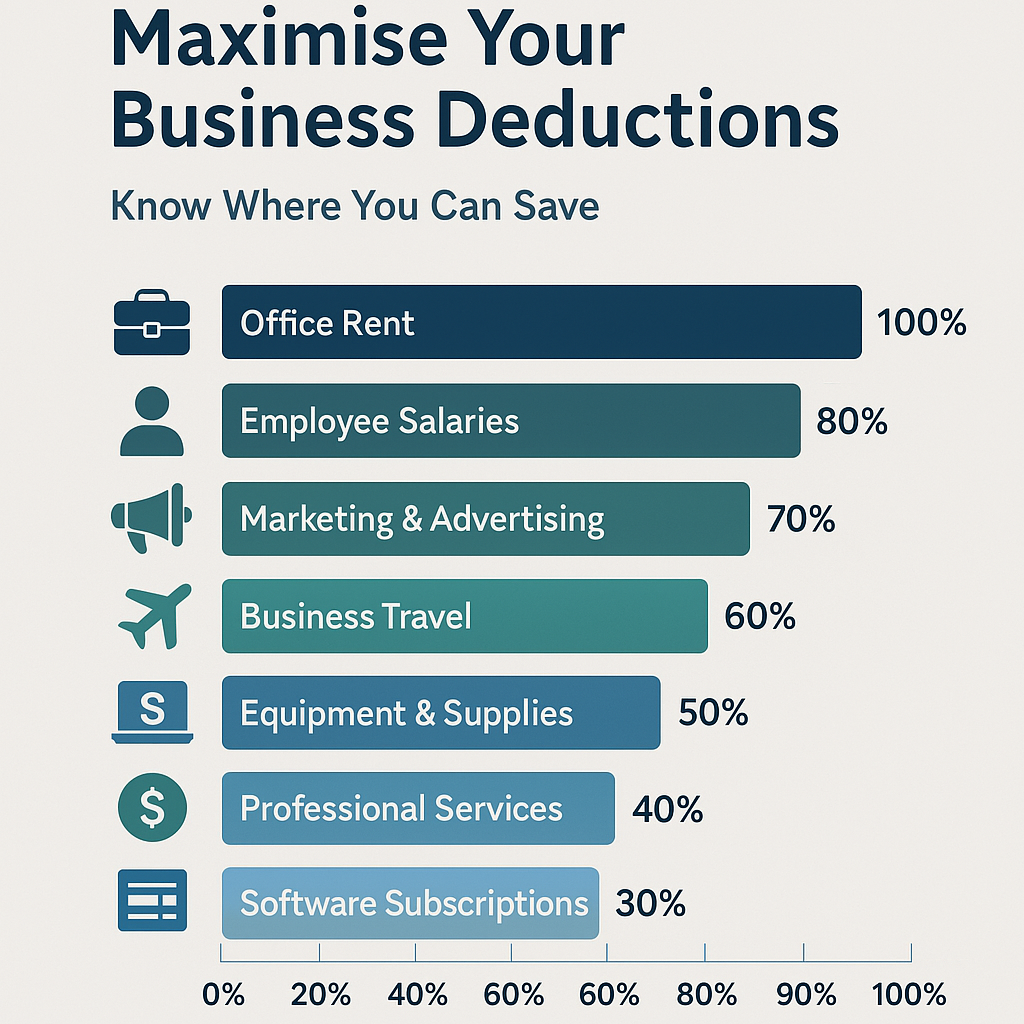Tax season often brings anxiety, especially for entrepreneurs, small business owners, and self-employed individuals who juggle multiple financial priorities. But did you know that many business owners pay federal income taxes unnecessarily due to missed opportunities for tax deductions, poor tax planning, or using the wrong business structure? If you’re looking for ways to reduce your corporate taxes legally and understand how to effectively pay taxes, this guide is your go-to resource.
We’ll walk you through proven, legal strategies to reduce taxable income, minimize your federal tax obligations, and retain more business income. Whether you’re filing your first tax return or optimizing your setup before the tax year ends, this guide will help you take advantage of key tax benefits, credits, and deductions.
Disclaimer: This content is for informational tax purposes only. Consult with our tax professionals for personalized advice based on your situation.
Understand Your Current Tax Burden

How Do Corporate Taxes Work?
Your corporate tax bill is calculated based on taxable income, your net income after subtracting deductible expenses from total revenue. However, your tax liability will vary depending on your business structure, location, and industry.
By making strategic state-level tax elections, businesses can optimize their federal taxable income, ultimately reducing the amount of federal taxes due.
What is Taxable Income for Businesses?
Taxable income for businesses is the portion of your business income that is subject to federal taxation. This encompasses income from various sources such as sales, services, and investments. Essentially, it’s the net income after subtracting allowable business expenses and deductions from your total revenue.
For small business owners, taxable income can include earnings from self-employment, such as those from a sole proprietorship or a single-member LLC. It also covers income from partnerships, S corporations, and C corporations. Understanding what constitutes taxable income is crucial for accurate tax planning and preparation, as it directly impacts your tax liability. By identifying all possible deductions and expenses, business owners can effectively reduce their taxable income and, consequently, their federal tax obligations.
How is Business Income Taxed?
Business income is subject to federal income taxes, and the rate at which it is taxed depends on the type of business entity and the amount of income earned. For small business owners, business income is often taxed as personal income, with the tax rate determined by the individual’s tax bracket.
For instance, if a small business owner earns $100,000 in business income and falls into a 24% tax bracket, they would owe $24,000 in federal income taxes. However, by deducting business expenses and reducing their taxable income to $80,000, their tax liability would decrease to $19,200. Additionally, business income may be subject to self-employment tax, which funds Social Security and Medicare. This tax is typically 15.3% of net earnings from self-employment and is reported on the business owner’s tax return.
Understanding how business income is taxed allows business owners to plan strategically, minimize their tax liability, and retain more of their profits.
Common Mistakes That Increase Your Tax Bill:

- Using the Wrong Structure: Choosing between an LLC, S Corporation, or C Corporation can significantly affect your federal income taxes, payroll taxes, and self-employment taxes.
- Missing Deductions: Many businesses fail to deduct expenses related to office supplies, qualified medical expenses, or employee wages.
- Lack of Documentation: Without proper records, you may not be able to claim tax deductible items or qualify for tax credits.
Why Optimizing Your Tax Strategy Matters
Every dollar you overpay in small business taxes is a dollar you’re not investing back into your business. That’s less capital for growth, hiring top talent, expanding your operations, or innovating your product.
Smart tax planning isn’t just about saving money, it’s about increasing your adjusted gross income, optimizing your cash flow, and legally reducing your federal, state, and local tax burden. With the right strategy, you can keep more of what you earn and redirect it into building long-term wealth.
Choose the Right Business Structure

LLC vs. S-Corp vs. C-Corp
- LLC: Flexible and suitable for pass-through entities; avoids double taxation but doesn’t reduce self-employment taxes by default.
- S-Corp: Offers pass-through treatment and can reduce FICA taxes and self-employment taxes by paying a reasonable salary and taking distributions.
- C-Corp: Suitable for larger businesses and service trades seeking investment. Offers opportunities for corporate tax cuts under the Tax Cuts and Jobs Act.
Why Restructuring Matters
Switching to a more tax-efficient entity can significantly cut your tax burden. For example, an LLC that elects to be taxed as an S-Corp may reduce self-employment taxes and unlock other tax advantages.
But it’s not just about LLCs and S-Corps international entrepreneurs, investors, and digital nomads can benefit even more from strategic restructuring. Whether it’s setting up a holding company in a zero-tax jurisdiction, moving operations offshore, or leveraging a UAE Free Zone entity, the right structure can protect assets, reduce audit risk, and legally lower your global tax bill.
The key is aligning your business model, revenue streams, and residency status with a structure that works for you – not against you.
Maximise Your Business Deductions

Commonly Overlooked Deductible Expenses
- Business-related expenses like software subscriptions, marketing tools, and health insurance
- Qualified business income (QBI) deductions for eligible pass-through entities
- Expenses incurred for R&D, travel, and training
Document Everything
To legally deduct expenses, keep receipts, categorise purchases, and track all business deductions. Good record-keeping is also vital for tax preparation and audits.
Reinvest Profits Tax-Efficiently
Instead of drawing profits, reinvest in deductible assets like equipment, hiring, or retirement accounts, to defer taxes and scale your business.
Leverage Tax Credits and Incentives
Popular Credits and Deductions for Small Businesses
- R&D Tax Credit
- Green Energy Tax Credits
- Hiring Incentives for veterans or disadvantaged groups
- Credits from the Inflation Reduction Act
Use tax professionals to identify and document eligibility for these valuable tax cuts, which can directly reduce your tax liability, not just your taxable income.
Employment Taxes and Benefits
Employment taxes and benefits are integral to running a business. As a business owner, it’s essential to understand the various types of employment taxes and the benefits available to you and your employees.
Understanding Employment Taxes
Employment taxes are levies that employers must pay on behalf of their employees. These include Social Security tax, Medicare tax, and federal income tax withholding. Employers are also responsible for paying federal unemployment tax (FUTA) and state unemployment tax. These taxes are typically paid quarterly, and the amount owed depends on the number of employees and the wages paid. Importantly, business owners can deduct employment taxes as a business expense on their tax return, which helps reduce their overall taxable income.
Paying for Health Insurance as a Tax Deduction
Health insurance premiums can be a significant expense for business owners and their employees. Fortunately, these costs can be deducted as a business expense on the business owner’s tax return, reducing taxable income and tax liability. This deduction can be particularly beneficial for small business owners with high health insurance premiums.
Moreover, business owners may qualify for the Small Business Health Care Tax Credit if they provide health insurance to their employees and meet certain eligibility criteria. This tax credit can further reduce the overall tax burden, making it a valuable benefit for both the business and its employees.
By understanding employment taxes and benefits, business owners can make informed decisions that optimize their tax savings. Consulting with a tax professional ensures that you are leveraging all available tax benefits to minimize your tax liability and maximize your business’s financial health.
International Structuring & Offshore Strategies

Reduce Your Tax Liability Legally
Expanding to tax-friendly jurisdictions like Hong Kong, the UAE, or Singapore can significantly reduce your company’s overall tax liability—especially when paired with proper structuring. These jurisdictions offer low or zero corporate tax rates, no capital gains taxes, and business-friendly regulatory environments.
When aligned with robust transfer pricing policies and compliance with economic substance rules, international expansion isn’t just a growth move -It becomes a strategic tax-saving tool. Whether you’re building a global brand or managing cross-border income streams, choosing the right jurisdiction can be the difference between overpaying and optimizing.
Understand Tax Consequences
Expanding internationally comes with opportunity, but also responsibility. Business owners must be aware of Controlled Foreign Corporation (CFC) rules, Subpart F income, and other reporting requirements that can trigger unexpected tax liabilities.
Failing to properly report foreign income or maintain compliance can result in steep penalties, audits, and even double taxation. Whether you’re running an offshore entity or managing cross-border investments, understanding the tax implications in both your home and host countries is essential for staying compliant and protecting your profits.
Create a Holding Company
Forming a holding company, whether domestically or offshore, offers more than just tax perks. It’s a sophisticated way to streamline ownership, protect assets, and unlock long-term strategic advantages.
By placing your operating companies, investments, or intellectual property under a central holding structure, you can:
- Control Risk – Isolate liability by separating high-risk operations from core assets.
- Simplify Ownership – Consolidate multiple businesses or investments under one umbrella for easier management and succession planning.
- Lower Taxes – In certain jurisdictions, holding companies enjoy tax exemptions on dividends, capital gains, or foreign-sourced income—resulting in significant savings.
- Enable Global Flexibility – A holding company can also act as a launchpad for international expansion and more favorable treaty access.
Strategic Timing and Profit Shifting
Year-End Tax Moves
The final quarter is your last chance to make impactful tax decisions for the year. Two tried-and-true strategies are:
- Accelerating Expenses: Prepaying certain business expenses, like subscriptions, rent, or vendor contracts in Q4 can reduce your taxable income for the current year. This is especially valuable if you expect to be in a lower tax bracket next year.
- Deferring Income: If you’re expecting a large payment in December, consider delaying invoicing until January (if cash flow allows). Deferring income shifts that revenue into the next tax year, helping manage your adjusted gross income (AGI) and potentially lowering your tax bracket.
When timed correctly, these moves can reduce both federal and state tax obligations while improving year-end financial flexibility.
Profit Shifting
Legal profit shifting between subsidiaries or across jurisdictions can lead to substantial tax savings, when done properly. By allocating income and expenses in line with transfer pricing rules and economic substance requirements, multinational businesses can optimize where profits are recognized and taxed.
This strategy is especially powerful in tax-friendly jurisdictions like the UAE, Hong Kong, or Ireland, where effective tax rates are significantly lower. However, documentation and compliance are everything. Poor structuring or lack of supporting documentation can trigger audits, penalties, and repetitional risk.
Build a Smart Tax Team
Complex strategies require a team:
- A corporate tax attorney
- A cross-border international consultant
- A CPA with expertise in business tax and the tax code
Proactive Tax Planning Pays Off
Strategic planning throughout the year allows you to make smarter moves, rather than reacting at the last minute during tax preparation. For example, setting up the right corporate structure or timing major expenses before year-end can dramatically lower your tax liability. These decisions are only possible with a proactive approach, not when you’re scrambling in April.
Final Thoughts: Keep More, Grow More
Learning how to legally reduce your corporate taxes is one of the most powerful steps you can take to boost net income, reinvest profits, and future-proof your business. Whether you’re deducting office supplies, optimizing your business structure, or leveraging international setups, the key is intentional tax planning with professional support.
Ready to take control of your taxes? Start your tax optimisation journey today and keep more of what you earn.




